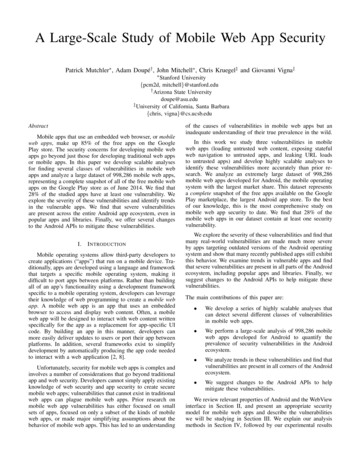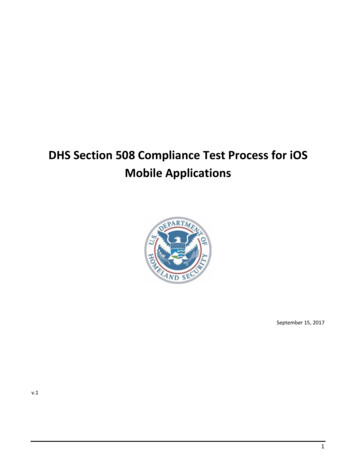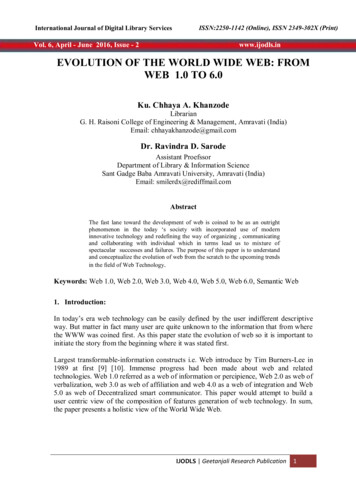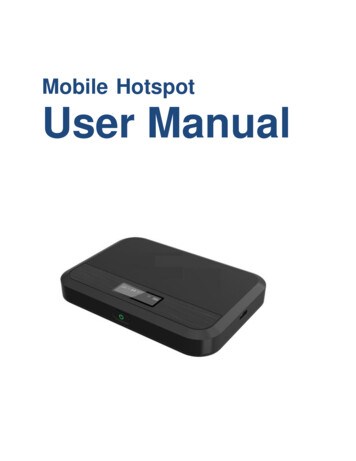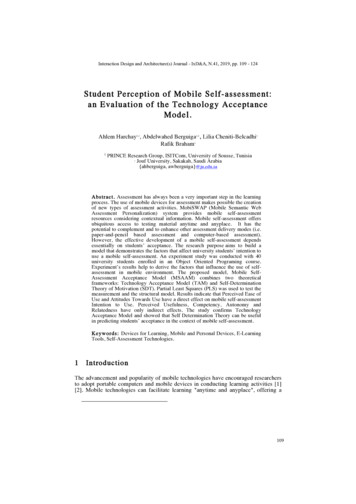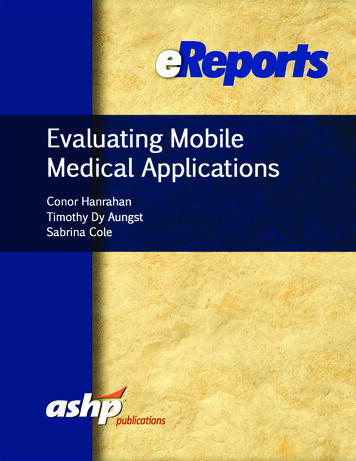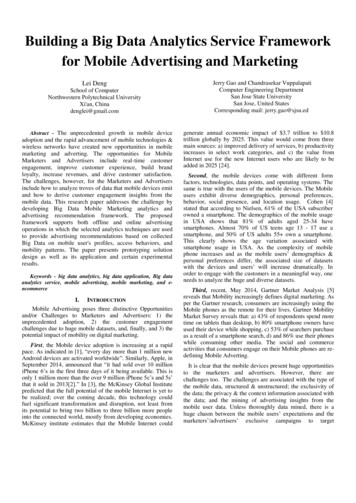
Transcription
JMIR MENTAL HEALTHSchlicker et alOriginal PaperA Web- and Mobile-Based Intervention for Comorbid, RecurrentDepression in Patients With Chronic Back Pain on Sick Leave(Get.Back): Pilot Randomized Controlled Trial on Feasibility, UserSatisfaction, and EffectivenessSandra Schlicker1,2, MSc; Harald Baumeister3, PhD; Claudia Buntrock1, PhD; Lasse Sander4, PhD; Sarah Paganini5,PhD; Jiaxi Lin6, PhD; Matthias Berking1, PhD; Dirk Lehr7, PhD; David Daniel Ebert1,8, PhD1Department of Clinical Psychology and Psychotherapy, Friedrich-Alexander-University Erlangen-Nürnberg, Erlangen, Germany2Department of Clinical Psychology and Psychotherapy, Philipps-University Marburg, Marburg, Germany3Department of Clinical Psychology and Psychotherapy, Ulm University, Ulm, Germany4Department of Rehabilitationpsychology and Psychotherapy, Albert-Ludwigs-University Freiburg, Freiburg, Germany5Department of Sport and Sport Science, Albert-Ludwigs-University Freiburg, Freiburg, Germany6Department of Psychiatry and Psychotherapy Medical Center, Albert-Ludwigs-University Freiburg, Freiburg, Germany7Health Psychology and Applied Biological Psychology, Leuphana University Lüneburg, Lüneburg, Germany8Faculty of Behavioural and Movement Sciences, Section of Clinical Psychology, Vrije University Amsterdam, Amsterdam, NetherlandsCorresponding Author:Sandra Schlicker, MScDepartment of Clinical Psychology and PsychotherapyFriedrich-Alexander-University Erlangen-NürnbergNägelsbachstraße 25aErlangen, 91052GermanyPhone: 49 91318567564Email: Sandra.Schlicker@fau.deAbstractBackground: Chronic back pain (CBP) is linked to a higher prevalence and higher occurrence of major depressive disorder(MDD) and can lead to reduced quality of life. Unfortunately, individuals with both CBP and recurrent MDD are underidentified.Utilizing health care insurance data may provide a possibility to better identify this complex population. In addition, internetand mobile-based interventions might enhance the availability of existing treatments and provide help to those highly burdenedindividuals.Objective: This pilot randomized controlled trial investigated the feasibility of recruitment via the health records of a Germanhealth insurance company. The study also examined user satisfaction and effectiveness of a 9-week cognitive behavioral therapyand Web- and mobile-based guided self-help intervention Get.Back in CBP patients with recurrent MDD on sick leave comparedwith a waitlist control condition.Methods: Health records from a German health insurance company were used to identify and recruit participants (N 76) viainvitation letters. Study outcomes were measured using Web-based self-report assessments at baseline, posttreatment (9 weeks),and a 6-month follow-up. The primary outcome was depressive symptom severity (Center for Epidemiological Studies–Depression);secondary outcomes included anxiety (Hamilton Anxiety and Depression Scale), quality of life (Assessment of Quality of Life),pain-related variables (Oswestry Disability Index, Pain Self-Efficacy Questionnaire, and pain intensity), and negative effects(Inventory for the Assessment of Negative Effects of Psychotherapy).Results: The total enrollment rate with the recruitment strategy used was 1.26% (76/6000). Participants completed 4.8 modules(SD 2.6, range 0-7) of Get.Back. The overall user satisfaction was favorable (mean Client Satisfaction Questionnaire score 24.5,SD 5.2). Covariance analyses showed a small but statistically significant reduction in depressive symptom severity in theintervention group (n 40) at posttreatment compared with the waitlist control group (n 36; F1,76 3.62, P .03; d 0.28, 95% CI 0.17 to 0.74). Similar findings were noted for the reduction of anxiety symptoms (F1,76 10.45; P .001; d 0.14, 95% CI 0.31http://mental.jmir.org/2020/4/e16398/XSL FORenderXJMIR Ment Health 2020 vol. 7 iss. 4 e16398 p. 1(page number not for citation purposes)
JMIR MENTAL HEALTHSchlicker et alto 0.60) at posttreatment. Other secondary outcomes were nonsignificant (.06 P .44). At the 6-month follow-up, the differencebetween the groups with regard to reduction in depressive symptom severity was no longer statistically significant (F1,76 1.50,P .11; d 0.10, 95% CI 0.34 to 0.46). The between-group difference in anxiety at posttreatment was maintained to follow-up(F1,76 2.94, P .04; d 0.38, 95% CI 0.07 to 0.83). There were no statistically significant differences across groups regardingother secondary outcomes at the 6-month follow-up (.08 P .42).Conclusions: These results suggest that participants with comorbid depression and CBP on sick leave may benefit from internetand mobile-based interventions, as exemplified with the positive user satisfaction ratings. The recruitment strategy via healthinsurance letter invitations appeared feasible, but more research is needed to understand how response rates in untreated individualswith CBP and comorbid depression can be increased.Trial Registration:German Clinical Trials Register DRKS00010820; https://www.drks.de/drks web/navigate.do?navigationId trial.HTML&TRIAL ID DRKS00010820.(JMIR Ment Health 2020;7(4):e16398) doi: 10.2196/16398KEYWORDSpilot project; low back pain; depressive disorder; mental health; sick leaveIntroductionBackgroundChronic back pain (CBP) is a pervasive condition with a12-month prevalence rate of 38% and a lifetime prevalence ofapproximately 40% in adults [1]. It is also associated with a 2to 3-fold increased risk for major depressive disorder (MDD)[2], increased morbidity, and diminished quality of life [3,4].In addition, depression is a core predictor of persistent painsymptoms, increased pain-related disability, and poor treatmentoutcomes [5-7]. MDD and CBP each account for 2% ofdisability-adjusted life years worldwide [8], with immense healthcare and socioeconomic costs due to productivity losses [9].Thus, from an individual and societal perspective, it isimperative to provide treatment options that decrease patients’burden and specifically target individuals’ ability to return towork following sick leave [10].Effective psychological face-to-face (f2f) treatments exist fordepression and CBP [11]. A recent meta-analysis found evidencefor the effectiveness of f2f treatments on depression symptomscompared with a nonactive control group (g 0.71, 95% CI 0.66to 0.77) [12]. However, we found no evidence for theeffectiveness of multidisciplinary treatments for CBP andcomorbid depression. Despite the availability of effective f2ftreatments, CBP patients with recurrent depression on sick leaveare a difficult-to-reach population with traditional therapybecause of a lack of medical and/or disease-related disabilityspecialists.Internet- and mobile-based interventions (IMIs) have thepotential to reach this population because they are easilyaccessible at any time and in any location. IMIs may beparticularly beneficial in psychological and medical treatmentsas they are accessible and scalable [13]. In addition, theeffectiveness of IMIs with mental disorders (eg, depression)[14], disease-related distress in chronic somatic conditions [15],cancer [16], pain [17-19], and coexisting somatic and mentalproblems (eg, diabetes and depression) [20] is well established.However, only a few studies have been conducted on theeffectiveness of IMIs for individuals with CBP and L FORenderXRecent studies are considering the effectiveness of an IMI ondepression in CBP patients following orthopedic rehabilitation,compared with treatment-as-usual (TAU) [21,22]. Irrespectiveof the findings of these studies, not all patients with CBP seekinpatient rehabilitation treatment. Hence, future research mustconsider other recruitment strategies. Using health record datamight be a valid and innovative recruitment strategy to identifyCBP patients with depression.ObjectivesThus, one aim of this pilot randomized controlled trial (RCT)was to investigate the feasibility of this recruitment
Internet- and mobile-based interventions (IMIs) have the potential to reach this population because they are easily accessible at any time and in any location. IMIs may be particularly benef icial in psychological and medical treatments as they are accessible and scalable [13]. In addition, the effectiveness of IMIs with mental disorders (eg .
